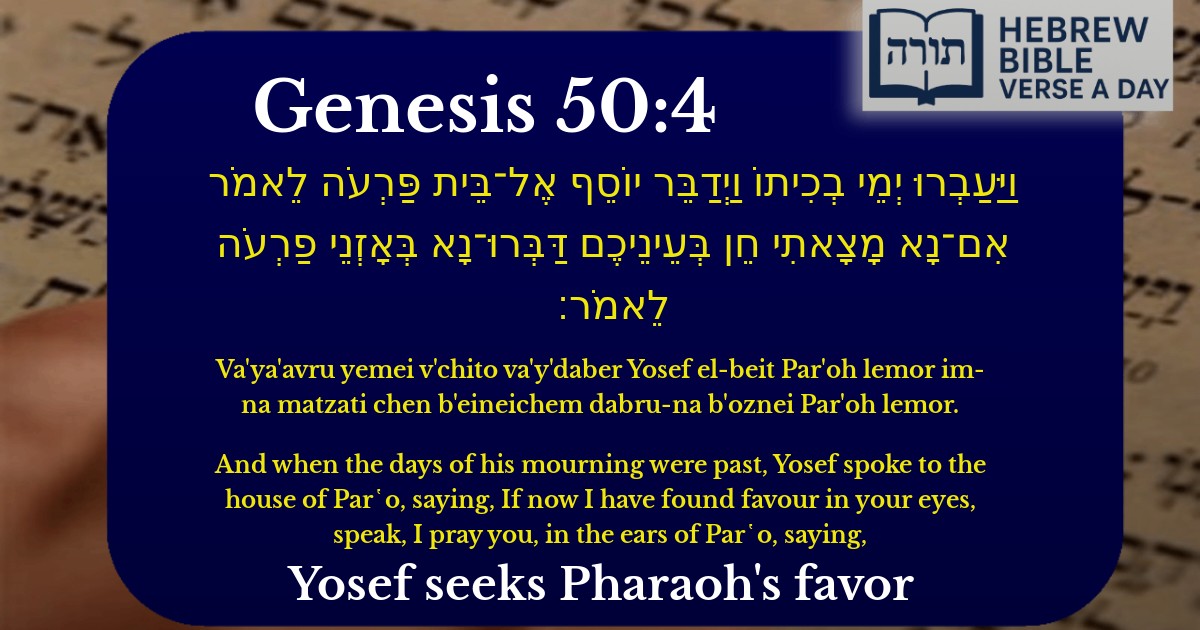Join Our Newsletter To Be Informed When New Videos Are Posted
Join the thousands of fellow Studends who rely on our videos to learn how to read the bible in Hebrew for free!
Hebrew Text
וַיַּעַבְרוּ יְמֵי בְכִיתוֹ וַיְדַבֵּר יוֹסֵף אֶל־בֵּית פַּרְעֹה לֵאמֹר אִם־נָא מָצָאתִי חֵן בְּעֵינֵיכֶם דַּבְּרוּ־נָא בְּאָזְנֵי פַרְעֹה לֵאמֹר׃
English Translation
And when the days of his mourning were past, Yosef spoke to the house of Par῾o, saying, If now I have found favour in your eyes, speak, I pray you, in the ears of Par῾o, saying,
Transliteration
Va'ya'avru yemei v'chito va'y'daber Yosef el-beit Par'oh lemor im-na matzati chen b'eineichem dabru-na b'oznei Par'oh lemor.
Hebrew Leining Text
וַיַּֽעַבְרוּ֙ יְמֵ֣י בְכִית֔וֹ וַיְדַבֵּ֣ר יוֹסֵ֔ף אֶל־בֵּ֥ית פַּרְעֹ֖ה לֵאמֹ֑ר אִם־נָ֨א מָצָ֤אתִי חֵן֙ בְּעֵ֣ינֵיכֶ֔ם דַּבְּרוּ־נָ֕א בְּאׇזְנֵ֥י פַרְעֹ֖ה לֵאמֹֽר׃
וַיַּֽעַבְרוּ֙ יְמֵ֣י בְכִית֔וֹ וַיְדַבֵּ֣ר יוֹסֵ֔ף אֶל־בֵּ֥ית פַּרְעֹ֖ה לֵאמֹ֑ר אִם־נָ֨א מָצָ֤אתִי חֵן֙ בְּעֵ֣ינֵיכֶ֔ם דַּבְּרוּ־נָ֕א בְּאׇזְנֵ֥י פַרְעֹ֖ה לֵאמֹֽר׃
🎵 Listen to leining
Parasha Commentary
📚 Talmud Citations
This verse is not quoted in the Talmud.


The Completion of Yosef's Mourning Period
The verse states, "And when the days of his mourning were past", referring to Yosef's mourning for his father Yaakov. Rashi (Bereshit 50:4) explains that the mourning period lasted for 30 days, as derived from the parallel case of Moshe's mourning (Devarim 34:8). The Ramban adds that Yosef observed the full mourning period despite his high position in Egypt, demonstrating his unwavering commitment to honoring his father.
Yosef's Diplomatic Approach to Pharaoh's Court
Yosef addresses "the house of Pharaoh" rather than Pharaoh directly. The Midrash (Bereshit Rabbah 100:8) suggests this reflects Yosef's wisdom in Egyptian court etiquette—he first sought the support of Pharaoh's advisors before making a direct request. The phrase "If now I have found favor in your eyes" mirrors Avraham's language to Bnei Cheit (Bereshit 23:4), showing Yosef's humility and diplomatic skill.
Theological Implications of Yosef's Conduct
The Kli Yakar emphasizes that Yosef maintained his Jewish identity in Pharaoh's palace. His insistence on proper mourning—and his careful speech—demonstrates that he never assimilated into Egyptian culture. The Netziv (Ha'amek Davar) notes that Yosef's phrasing "if I have found favor" reflects his awareness that true success comes from Divine favor, not human approval.
Halachic Dimensions of Mourning
The Talmud (Moed Katan 20a) derives from this verse that formal mourning (avelut) concludes after 30 days. Rambam (Hilchot Avel 6:1) codifies this as halacha, showing how biblical narratives establish enduring Jewish practices. The phrase "days of mourning" (ימי בכיתו) uses the singular form, teaching (as noted by Malbim) that true mourning requires complete emotional engagement during the designated period.